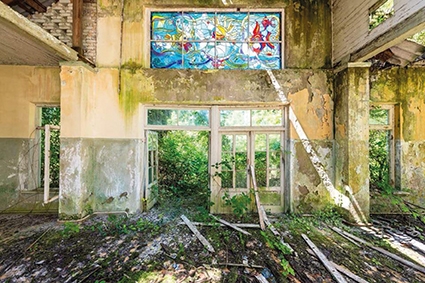Resolution of Silence: Abkhazia
Georgian EuroArt and Dutch ArtEcho Foundations, directed by Dali de Graaf-Ubilava, together with Georgian and foreign partners, have organized an exhibition of the French artist Aurélien Villette, ‘Resolution of Silence – Abkhazia’ at the Georgian National Museum which is set to run September 27 to October 7.
The opening ceremony was attended by special guests from different countries as well as locals who witnessed a play performed by the Professional State Youth Theater of Sokhumi ‘White Wave’ and theAbkhazian State Choir Chapel led by Zviad Bolqvadze.
“25 years ago, an unintended and devastating conflict began, and we wanted to show respect to everyone who is connected with it through this exhibition. This is a common problem and involves everyone. We couldn’t prevent the separation process and the humanitarian situation is worsening. It’s high time to realize that this story does not have a winning state,” said the State Minister of Georgia for Reconstruction and Civil Equality, Ketevan Tskikhelashvili.
Architectural photographer Aurélien Villette started traveling and taking photos in 2008. Since then, he has traveled to over 30 countries to discover different peoples, their cultures and stories. During his research, in 2016 he stopped on the eastern shore of the Black Sea, in occupied Abkhazia. The lens of his camera caught several frozen decades of the 20th century at once. The armed conflict of the 1990s had turned this once beautiful and vivid place into a sort of ghost shelter and yet also a source of inspiration for Villette’s photo series.
The artist expresses the full nostalgia and silent loneliness which has settled in the territory in his own unique way. Looking at his pictures, every single moment, place or aspect of Georgia appears in front of you with emotion, as if the French artist is from Abkhazia and is telling you the whole history from personal experience. Every single photo expresses strong silence and tells you how beautiful and free the region was. A quarter of a century has passed and nothing has changed. The region is becoming a ghost town.
Abkhazia remains a closed zone for Georgian people and relations are almost fruitless. The photos confirm that the art and visual sides are increasing in popularity as a way to describe and deal with the conflict, precisely with the resolution of silence as shown by the European artist.
“Resolution of silence- the silence you grasp, which makes expectations, faith and hope special. I am convinced that if those Abkhazians who helped this amazing artist there, were here, they would have a different perception about what they see. They will have the exact emotions that we have now: forgiveness, love and hope to return to each other. Today, numerous events are held on this topic, meaning we are making progress and will tell our friends, relatives, acquaintances and fellow Abkhazians –let’s love and return to each other. Thank you Aurélien Villette and organizers for such an amazing project,” said Vakhtang Kolbaia, Chairman of the Autonomous Republic of Abkhazia
The exhibition opened on the 25th anniversary of the war when around 250 000 refugees were forced to abandon their homes in Abkhazia. Situated in the north-western corner of Georgia with the Black Sea to the south-west and surrounded by the Caucasus Mountains and Russia to the north-east, Abkhazia, named the “Pearl of the Soviet Union” was once known as a prime holiday destination for the Soviet elite. The Georgian public remembers Abkhazia as one of the most beautiful places in the country, where families spent time resting and recharging whatever the season. Now there are only abandoned buildings, poor people, feelings, emotion, sadness and pain, yet still with evidence of hope for a better future.
Through the exhibition, the architectural photographer gives people a chance to see that native environment. The French artist and his lens act in this case as mediators between vivid memories of the past, destroyed by the war in the 1990s, and the sad, silent present: a guide connecting past with present. He also creates a space to think, forgive each other, live together peacefully, and contemplate missed relationships and rebuilding.
These types of exhibitions and events are extremely important for Georgia. Here is a generation which knows almost nothing about Abkhazia. Only some nice pictures, videos on social networks: memories little by little disappearing. These events will show them the need to think more, analyze, suffer, become motivated and to take on a role in their own society.
The opening ceremony concluded by showing video footage of old Abkhazia in the yard of the National Museum. Guests got to see not only new pictures by Aurélien Villette, but to remember the life the region once had: the people, everyday lives and freedom surrounded by spectacular landscape and the sea.
By Mariam Merabishvili











